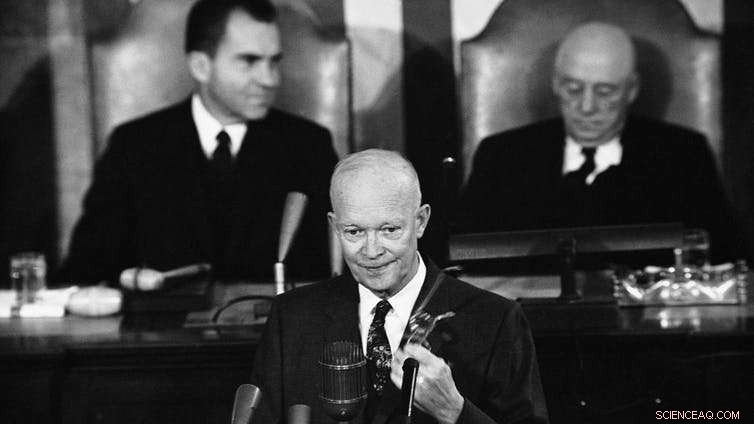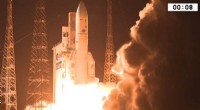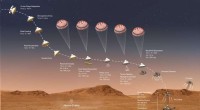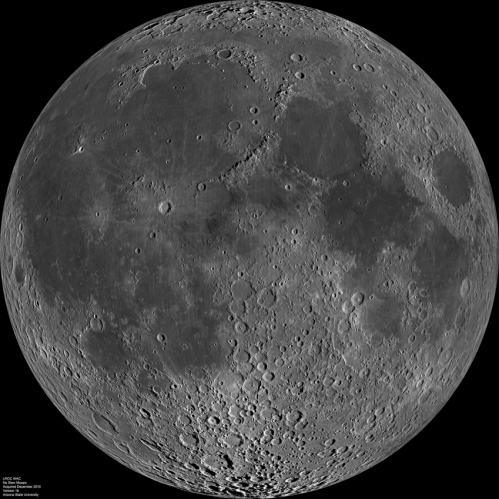
Wetenschap
Zou een ruimtemacht het einde van NASA betekenen?

President Eisenhower tijdens een gezamenlijke zitting van het Congres in 1958. Achter de president staan vice-president Richard Nixon, links, en voorzitter van het Huis Sam Rayburn, Rechtsaf. Krediet:NASA
Ruimte, die laatste grens, is iets dat de aandacht trekt van een land dat van nature geneigd is te geloven in ideeën als 'Manifest Destiny' en Amerikaans uitzonderlijkheid. Maar hoe goed past een Space Force in die rekening? En zou een ruimtemacht een militaire ruimtewedloop nieuw leven inblazen en diplomatieke spanningen met China en Rusland aanwakkeren?
Opgegroeid in Florida, Ik had het geluk om de lancering van de spaceshuttle te zien met iets dat op regelmaat leek. Toen ik ouder werd en voor het eerst leerde over de geschiedenis van NASA, zijn heldendaden tijdens de Space Race en dan zijn uitdagingen, Ik verloor nooit het gevoel van verwondering over wat NASA kon doen. Ik kreeg ook waardering voor de moeilijkheden die het moest overwinnen om die resultaten te bereiken. Ik heb van deze interesse een academische carrière gemaakt waarin ik de politiek van de ruimte bestudeer, wetenschap en geneeskunde.
De invloed van NASA is duidelijk te zien op deze andere gebieden, evenals in ons dagelijks leven. Technologieën die zijn ontwikkeld om ruimteverkenning mogelijk te maken, hebben geleid tot consumenteninnovaties zoals krasbestendige lenzen en CAT-scans. Onze mobiele telefoons zouden niet mogelijk zijn zonder de miniaturisering van chips tijdens het Apollo-programma of militaire GPS-satellieten. Gezien deze voordelen, we vergeten vaak de moeilijke aard van ruimtevluchten en de middelen die nodig zijn om het te volbrengen.
Inderdaad, het onderzoeken van de ervaringen en politieke lessen van NASA onthult de moeilijkheden bij het opzetten van een nieuwe overheidsinstantie en het lanceren van een organisatie wiens taak het is om moeilijke dingen tegen hoge kosten te doen. Als we naar de ups en downs van de geschiedenis van NASA kijken, zien we dat er in eigen land potentiële voordelen zijn, maar dat ze een groter internationaal risico met zich mee kunnen brengen.
Wat is een ruimtekracht, en wat zou het eigenlijk doen?
Tijdens een rally in maart van dit jaar, President Donald Trump noemde voor het eerst het idee van een ruimtemacht. Vanaf dat moment, de president heeft zowel over het idee getweet als het Pentagon opgedragen een plan te ontwikkelen om een onafhankelijke zesde tak van het leger te creëren. Reagerend op de richtlijnen van de president, het Pentagon bracht in augustus een rapport uit. Hoewel het rapport werd bestempeld als "definitief, " zijn 15 pagina's zijn kort op details, lang op gespreksonderwerpen, en licht op details over waarom er een Space Force moet zijn.
Het Witte Huis en het Congres hebben het idee al een tijdje overwogen. Tijdens het debat over de National Defense Authorization Act 2017, leden van de House Armed Services Committee voegden een bepaling toe tot oprichting van een "Space Corps". Het voorgestelde Space Corps zou binnen de luchtmacht worden gehuisvest, maar de voorziening werd later verwijderd tijdens de onderhandelingen tussen het Huis en de Senaat vanwege bezwaren van zowel het Witte Huis als minister van Defensie James Mattis. Hoewel hij nu zijn steun heeft uitgesproken voor een ruimtemacht, Mattis was er aanvankelijk tegen vanwege budgettaire en overheadproblemen.
De focus op de ruimte kwam ook naar voren in de Nationale Veiligheidsstrategie die in december 2017 werd uitgebracht en de Nationale Ruimtevaartstrategie die in maart werd uitgebracht.
Naast tweets en vermeldingen, het Witte Huis niet, Naar mijn mening, maakte een overtuigend argument voor waarom zo'n kracht nodig is. Het Pentagon-rapport, die zogenaamd de basis legt, stelt dat "potentiële tegenstanders nu actief manieren ontwikkelen om ons gebruik van de ruimte in een crisis te ontzeggen. Het is absoluut noodzakelijk dat de Verenigde Staten hun beleid aanpassen, doctrine en mogelijkheden om onze belangen te beschermen."
De militaire wortels van ruimteverkenning en de vroege lessen van NASA
Om te zeggen dat leger en ruimte met elkaar verweven zijn, is een understatement. Satellieten zorgen voor civiele communicatie, maar doen hetzelfde voor militaire eenheden. Ruimteanalisten noemen dit "dual-use" en het is ook wat het zo moeilijk maakt om vreedzame, civiele activiteiten van militaire.

New York City verwelkomt de Apollo 11-bemanning in een tickertape-parade langs Broadway en Park Avenue. Afgebeeld in de voorste auto, van rechts, zijn astronauten Neil A. Armstrong, Michael Collins en Buzz Aldrin. De drie astronauten werkten samen voor de eerste bemande maanlanding, op 20 juli, 1969. Krediet:NASA
De militaire en civiele wortels van de verkenning van de ruimte zijn nauw met elkaar verbonden. Toen de Sovjet-Unie in oktober 1957 Spoetnik lanceerde, het veroorzaakte paniek in de Verenigde Staten over het vermogen van de Sovjets om de ruimte te verkennen, maar over hun vermogen om dodelijke aanvallen op Amerikanen uit te voeren. Dus, de Space Race is niet geboren uit een verlangen om vreedzaam de ruimte te verkennen, maar Koude Oorlog politiek.
Voorzitter Dwight Eisenhower, careful not to read too much into the Soviet abilities, was cautious in responding to the threat. Although Eisenhower initially wanted the space effort to be run by the military, he was persuaded to create a more open, civilian space program in part to lessen "attention on U.S. national security space efforts." Legislation creating NASA was passed in 1958 with NASA opening its doors Oct. 1 of that year.
There are two lessons to be taken from NASA's establishment and early history. Eerst, it was an agency born of a crisis. The United States was seemingly falling behind its Cold War adversary and the public demanded that the government respond. Crisis often precedes the establishment of new government agencies and provides those agencies with a base of public and political support.
In terms of a Space Force, there is no apparent crisis. We know that both Russia and China have been developing military capabilities in space. China first tested an anti-satellite weapon in 2007 and more recently, Russian satellites have been demonstrating new capabilities. There are most likely other military activities in these states, and perhaps others, they have undertaken that remain classified. Als dit de zaak is, then I believe the administration needs to lay a stronger foundation for why a Space Force is needed because lacking a crisis, support is often hard to come by.
A second, and related, lesson is in terms of public support. Although Americans tend to remember the space programs of the 1960s favorably, public support for NASA began to fall in the early 1960s and as Roger Launius, a NASA historian, writes, the data "do not support a contention that most people approved of Apollo and thought it important to explore space." Along with this came a drop in funding that left NASA scrambling in the late 1960s to accomplish Kennedy's goal of landing a man on the moon by the end of the decade. Studies of public opinion often demonstrate a "thermostatic" relationship between public opinion and funding.
For the Space Force, public opinion is upside down. In recent polls, CNN found that 55 percent of Americans do not support the establishment of a Space Force while Rasmussen (typically a Republican-leaning poll) found that 40 percent of Americans are opposed, while 27 percent were unsure. If support and funding go hand in hand, these findings do not put the Space Force on a sustainable footing.
Consequences of a Space Force for NASA and militarization of space
Should the Trump administration succeed in establishing a Space Force or something like it, the move may have serious consequences for NASA. Depending on its mission, the Space Force is likely to require launch capabilities for satellites and perhaps human missions. Although a Space Force may be able to purchase these services from companies like SpaceX, if they choose to develop an in-house launch system, they may duplicate already existing NASA efforts. Doing so would also likely cause a brain drain at NASA as in-house engineers and experts migrated to the Space Force with promises of new missions and new funding.
There is also a question of whether the Space Force may simply take over current NASA missions. In the wake of the Space Force announcement, the Trump campaign sent out an email to supporters asking them to vote on a potential logo. Although this was a fundraising maneuver, one of the "logos" was themed around Mars with the wording "Mars Awaits." Given that the overall mission of the Space Force remains unclear, there could be a push for human spaceflight efforts to be subsumed under a Space Force. NASA's recent failures in the development of the Space Launch System, or SLS, and the James Webb Space Telescope only further reinforce the image of a NASA spread too thin to accomplish major space endeavors.
Eindelijk, NASA's budget is already quite low considering its mission:US$19.7 billion in 2017 with $19 billion requested for 2018. This represents less than 0.5 percent of the overall federal budget. A Space Force could feasibly take away funding from NASA, especially for the development of human spaceflight capabilities thus cannibalizing NASA's already low budget.
In terms of geopolitics, establishing a Space Force could create a point of no return in of militarization of space. From Eisenhower onwards, U.S. policymakers have avoided the appearance of overt military influence in space. Both the United States and the Soviet Union joined the 1967 Outer Space Treaty, which stipulated, onder andere, the peaceful use of outer space and a ban on nuclear weapons. Following the Space Force announcement, Russian officials warned about potential violations of the treaty and that Russia might choose to withdraw from the treaty if the U.S. did.
Joan Johnson-Freese, a space policy expert, warns in her recent book that the pace of American militarization of space has been increasing, perhaps to the point of no return. Her warning is that policymakers think about further actions before stepping into an arms race for which no one is prepared. While President Trump has certainly shaken up America's relations with other countries, such a drastic change in American posture could have significant and irreversible effects, creating a second space race. While it could have benefits for American society much as the original space race did, deze keer, I believe the dangers are likely to be far higher.
Dit artikel is opnieuw gepubliceerd vanuit The Conversation onder een Creative Commons-licentie. Lees het originele artikel. 
 Onderzoeker helpt bij het classificeren van nieuwe vormen van duurzame lichtenergie
Onderzoeker helpt bij het classificeren van nieuwe vormen van duurzame lichtenergie Eerste grootschalige studie van cocaïnegebruikers leidt tot doorbraak in drugstesten
Eerste grootschalige studie van cocaïnegebruikers leidt tot doorbraak in drugstesten Nieuwe productiemethode voor fullereenkristal 50 keer sneller dan zijn voorganger
Nieuwe productiemethode voor fullereenkristal 50 keer sneller dan zijn voorganger Efficiënte depolymerisatie in vaste toestand van PET-afval
Efficiënte depolymerisatie in vaste toestand van PET-afval Lab ontdekt kleine Kaïn-en-Abel-molecuul
Lab ontdekt kleine Kaïn-en-Abel-molecuul
 Minstens 304 doden, 1, 800 gewonden bij krachtige aardbeving in Haïti
Minstens 304 doden, 1, 800 gewonden bij krachtige aardbeving in Haïti Sub maakt snelle stijging in Indische Oceaan; bemanning veilig
Sub maakt snelle stijging in Indische Oceaan; bemanning veilig Milieuvriendelijke veehouderij (echt waar)
Milieuvriendelijke veehouderij (echt waar) Vraag en antwoord:Fysische wetenschappers wenden zich tot deep learning om de modellering van aardsystemen te verbeteren
Vraag en antwoord:Fysische wetenschappers wenden zich tot deep learning om de modellering van aardsystemen te verbeteren Wetlands spelen een cruciale rol bij koolstofopslag, studie vondsten
Wetlands spelen een cruciale rol bij koolstofopslag, studie vondsten
Hoofdlijnen
- Ontdekking van een potentieel therapeutisch doelwit om trypanosomen te bestrijden
- Hoe soorten versteend hout te identificeren
- De structurele stabiliteit van de DNA-dubbele helix
- Is geluk besmettelijk?
- De krimpende eland van Isle Royale
- Nieuwe aanwijzingen uit hersenstructuren van bidsprinkhaangarnalen
- Soorten organellen
- Nieuwe tools helpen bij het zoeken naar levensverlengende chemicaliën
- Hoe synesthesie werkt
- Uranus heeft mogelijk twee onontdekte manen

- NASA-missie gelanceerd; zal een revolutie teweegbrengen in ons begrip van ruimteweer

- NASA's Perseverance-rover 22 dagen na landing op Mars

- Nieuwe theorie legt uit hoe de maan daar kwam

- Nieuw federaal beleid zou de kosten van studentenruimtevaartuigen verhogen, dreigend technologieonderwijs

 Natuurkundigen melden een manier om donkere materie te horen
Natuurkundigen melden een manier om donkere materie te horen Lineaire vergelijkingen grafisch weergeven met twee variabelen
Lineaire vergelijkingen grafisch weergeven met twee variabelen Virtueel wandelsysteem om de reis van een andere persoon opnieuw te beleven
Virtueel wandelsysteem om de reis van een andere persoon opnieuw te beleven Beperking blootgelegd in veelbelovend kwantumcomputermateriaal
Beperking blootgelegd in veelbelovend kwantumcomputermateriaal Scholes vindt nieuw magnetisch veldeffect in diamagnetische moleculen
Scholes vindt nieuw magnetisch veldeffect in diamagnetische moleculen Waarom tirannie het onvermijdelijke resultaat van democratie zou kunnen zijn?
Waarom tirannie het onvermijdelijke resultaat van democratie zou kunnen zijn? Nieuw staal om de levensduur van olieveldpijpleidingen te verdubbelen
Nieuw staal om de levensduur van olieveldpijpleidingen te verdubbelen Interstellair medium van SDSS J2310+1855 verkend met ALMA
Interstellair medium van SDSS J2310+1855 verkend met ALMA
- Elektronica
- Biologie
- Zonsverduistering
- Wiskunde
- Italian | Spanish | Portuguese | Swedish | German | Dutch | Danish | French | Norway |

-
Wetenschap © https://nl.scienceaq.com

